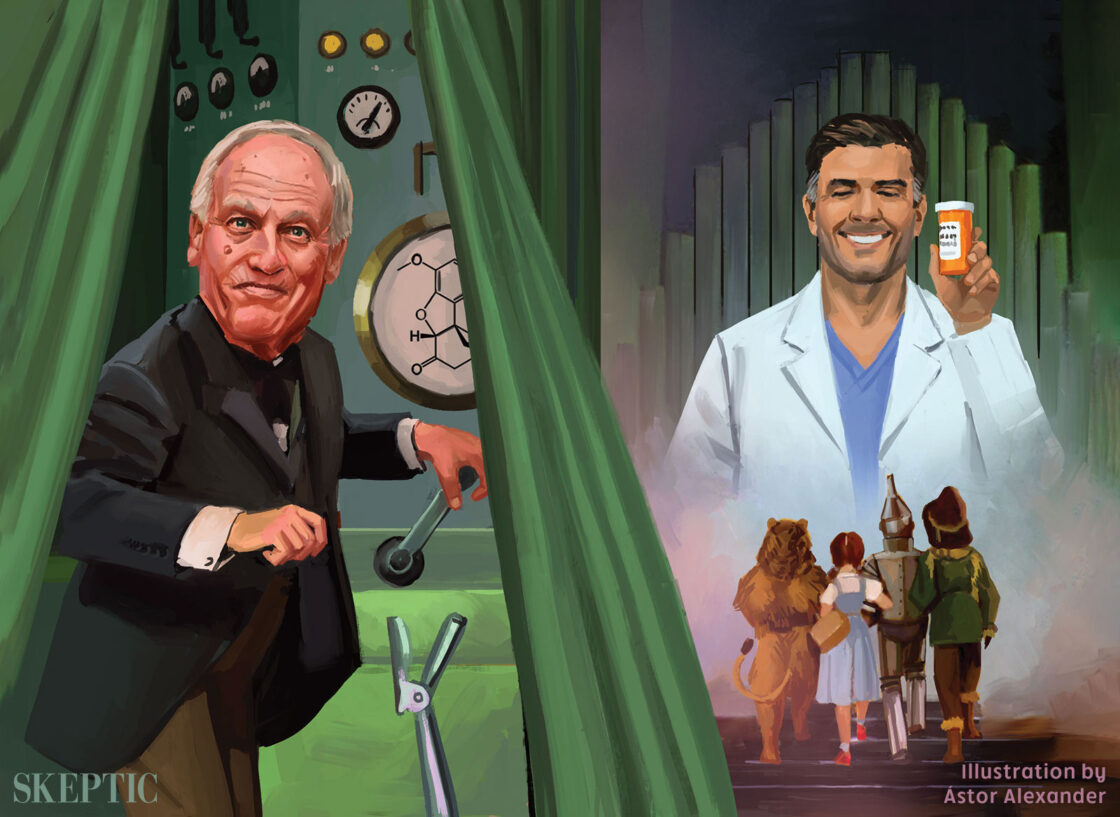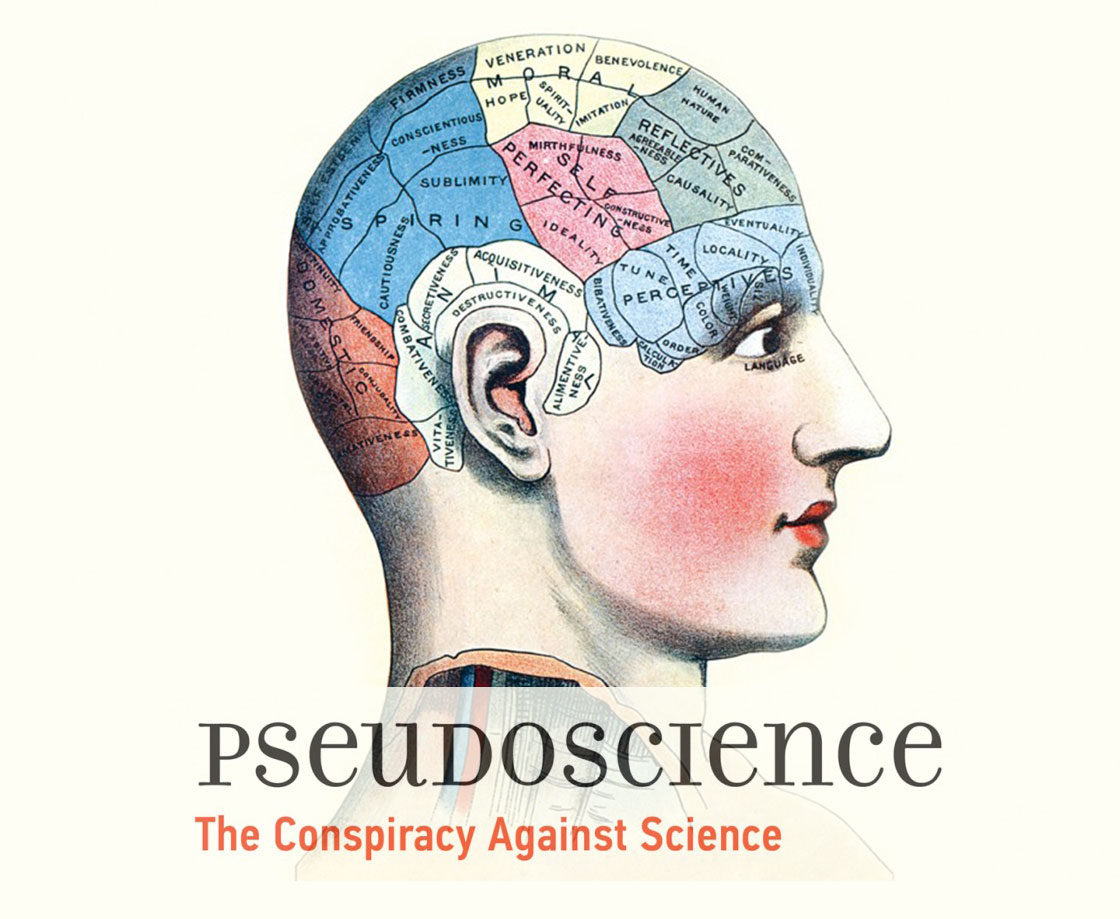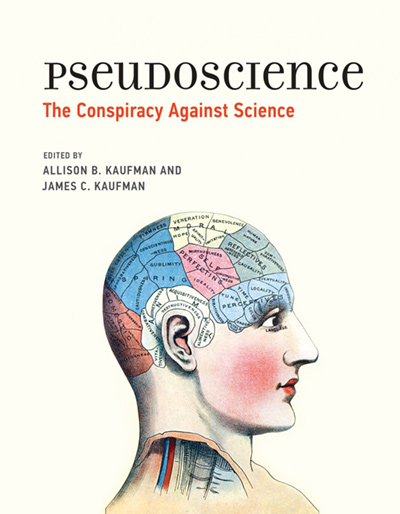We live in a post-truth, anti-intellectual world where intuition, “common sense,” and fake news are often preferred to scientific evidence, and where pseudoscience is often presented as valid science. Assuming that truth exists and is worth searching for, and that science is our most reliable tool in that search, how can we identify pseudoscience and combat it effectively?
Allison B. Kaufman and James C. Kaufman have edited a collection of articles with the title Pseudoscience: The Conspiracy Against Science. The contributors are experts in various fields who have different approaches to the subject. The result is an invaluable volume that examines the cognitive biases that lead to pseudoscience, the history of pseudoscience, the reasons for its wide acceptance, how it is endangering our society, how to recognize it, and how we might reduce its impact.
In the first chapter, David Hecht argues that understanding pseudoscience is as important as debunking it. Science and pseudoscience are opposite ends of one spectrum; we can easily identify the extremes, but there is no clear line separating them. Pseudoscientific beliefs are not as random or indefensible as they seem, and science is not as objective and detached as we like to think. Science is powerful but imperfect; and until we understand its limitations, we shouldn’t condemn those who choose not to trust it. We must avoid dogmatism and remember that scientific knowledge is always provisional.
In a chapter titled “The Psychology of (Pseudo) Science: Cognitive, Social, and Cultural Factors,” Emilio Lobato and Corinne Zimmerman show that pseudoscientific and scientific beliefs are essentially formed in the same way and are subject to the same cognitive biases and social influences. In a chapter on “The Illusion of Causality: A Cognitive Bias Underlying Pseudoscience,” Fernando Blanco and Helena Matute explain the psychology of causal illusions and argue that they are one of the central problems underlying pseudoscience. Other chapters discuss what pseudoscience costs society, factors that affect scientific soundness, pseudoscience in the mainstream, and science activism.
David Gorski explains how the misguided concept of “integrative” medicine has allowed the infiltration of quackery into academia, taking advantage of the blind spot of evidence-based medicine: biological plausibility. Britt Marie Hermes, a former naturopath turned whistleblower, deconstructs the core principles of naturopathy. Kevin Folta examines the weapons and tactics in the war on crop biotechnology. Chad Orzel argues that scientific failures like cold fusion and the report of faster-than-light neutrinos are a good thing: they demonstrate how science responds to criticism and corrects its mistakes, while pseudoscience fails to engage meaningfully with criticism. Other chapters examine the science and pseudoscience behind the anti-vaccine movement, IQ tests, hypnosis, parapsychology, AIDS denialism, over-protection of children, and the challenges of changing minds. There is an excellent discussion of predatory journals and the failures of peer review. And much more.
Indre Viskontas shows how confirmation bias and pattern recognition affect our search for meaning, and she explains the multiple comparisons issue. In neuroimaging, “By setting a statistical threshold fairly low and not correcting for multiple comparisons, one can find activation in virtually any part of the brain during any task.”
In the final chapter, “Truth Shall Prevail,” Paul Joseph Barnett and James C. Kaufman stress that scientists are searching for the truth, sometimes at great personal cost. “Humility, or a reticence to speak in absolutes, is the single greatest distinction between the sides of pseudoscience and evidence-based science.” They add, “Responding to pseudoscience takes its toll. Scientists get frustrated when they have to repeat facts, refute the same fallacious arguments, and end up in defensive positions because their detractors are not bound to the same rules. Like nuisance lawsuits, pseudoscience rarely plays to win; the goal is simply not to lose. Getting people to doubt science counts as a victory.”
We clearly have our work cut out for us, but truth will prevail in the end. In a foreword, psychologist Scott Lilienfeld summarizes the valuable lessons in this book:
- We are all subject to cognitive biases.
- We are largely unaware of our biases.
- Science is a systematic set of safeguards against biases.
- Scientific thinking doesn’t come naturally to humans.
- Scientific thinking is exasperatingly domain-specific. Even Nobel Prize winners can fall prey to pseudoscience in fields outside their area of expertise.
- Pseudoscience and science lie on a spectrum.
- Pseudoscience is characterized by a set of fallible, but useful, warning signs such as an absence of self-correction, overuse of ad hoc maneuvers to immunize claims from refutation, use of scientific-sounding but vacuous language, extraordinary claims in the absence of compelling evidence, over-reliance on anecdotal and testimonial assertions, avoidance of peer review, etc.
- Scientific claims can be wrong. Pseudoscientific claims differ from erroneous claims in that they are deceptive: they appear to be scientific, but they are not.
- Scientific and pseudoscientific thinking are cut from the same basic psychological cloth. Heuristics (mental shortcuts or rules of thumb) are invaluable in everyday life, but when misapplied they can lead to mistaken conclusions.
- Skepticism differs from cynicism. Skeptics must guard against dismissing implausible claims out of disconfirmation bias.
Lilienfeld concludes, “These lessons should also remind readers that we are all susceptible to questionable claims, and that science, although hardly a panacea, is ultimately our best bulwark against our own propensities toward irrationality.”
This is a long, dense, heavily referenced book. Some of the chapters are written in a more academic, rather dry style and even include (gasp!) equations. Others are more engaging. I especially enjoyed Kevin Folta’s creative and amusing use of language in his chapter on GMOs. Some examples:
- Plant genetic improvements put the petal to the metal.
- The unsinkable rubber duckies of pseudoscience.
- The scientific community yawned.
- What happens in the petri dish stays in the petri dish
- I can kill the most aggressive cancer cells in a dish with a hammer. It does not mean hammers cure cancer.
- A thin film of goo in a dish is not people.
- Pseudoscientific leanings that are more like falling-overs.
This book is a tour-de-force, a compendium of vital information about science, especially as it pertains to current topics in the media, and about the forces that conspire against science. We all need to know about these things. We ignore them at our peril. The book is an excellent antidote to fake news and a handy reference. It’s not easy going, but it’s well worth the effort. ![]()
About the Author
Dr. Harriet Hall, MD, the SkepDoc, is a retired family physician and Air Force Colonel living in Puyallup, WA. She writes about alternative medicine, pseudoscience, quackery, and critical thinking. She is a contributing editor to both Skeptic and Skeptical Inquirer, an advisor to the Quackwatch website, and an editor of sciencebasedmedicine.org, where she writes an article every Tuesday. She is author of Women Aren’t Supposed to Fly: The Memoirs of a Female Flight Surgeon. Her website is SkepDoc.info.
This article was published on May 23, 2018.



















Request that your local university library purchase the book, and/or wait a year and try to get it through the public library’s Interlibrary Loan. It’s probably too academic (and pricey) for small or midsize public libraries to purchase, but you can certainly try recommending it to a big-city public library (Dallas, New York, Chicago.) I still purchase a ton of books myself to support authors, but your library is the place to seek out the expensive books you want to read! (/unpaid advertisement from a retired public librarian)
good review. wish the book was not so expensive. !!! even the kindle is pretty pricey.
Human beings demand that their personal image of the world be hospitable to their most urgent interests. So there is a fantasy that is created in our brains that centers around simple answers that we are able to easily justify.
It is much more simple to dismiss “elite” ideas and findings by scientists and researchers and, instead explain things of the world in short personal conclusions that we believe are an adequate conclusion. Our brains are “wired” exactly that way because we evolved, as evolutionary biologists will remind us, as animals, shaped by natural selection (survival of the fittest) not for discovering great truths of nature, but for breeding. Natural selection also “designed” us to live only long enough to reproduce and raise our children. Senescence does not result from any single cause or even a suite of causes; it is woven inextricably into the fabric of our bodies. We have developed many remedies to prolong our earthly time, but we probably will always be “mortal”.
Many of the comments are right on about pseudoscience and why it is so attractive to so many of the “common folk” of the world. It can be very comforting and does not require involved investigations as Paul Berg suggested. “Short-cutting”, as indicated by Armando Simon’s remarks seem to show that some people don’t wish to study topics in any tedious, methodological way. It is much easier to dismiss other people’s efforts to understand the world.
Excellent review Dr. Hill. My opinion is that you do not have any axes to grind. Keep up the good work.
Bad Boy Scientist: I don’t think social sciences are cargo cult, or pseudo. They are simply not hard “sciences” in the sense of physics or chemistry. There are too many variables involved, including what Donald Rumsfeld famously called ‘unknown unknowns’ – factors we don’t even realize we should be taking into account when we analyse field observations or design experiments. For that matter, clinical medicine is not properly “science” for the same reason, and much of biology, particularly taxonomy, may hover on the cusp.
“Humility, or a reticence to speak in absolutes” … um, you (not Dr Hall, the author she’s quoting) mean “reluctance.” More than compensated for by “the unsinkable rubber duckies,” which, pace the Internet cliché, actually did make me literally LOL. I Googled this title and wish I could afford it; like most university press books, it is beyond my meagre means.
I just read an article in Time Magazine referencing the book by Lisa Feldman Barrett, PH.D who wrote “How Emotions Are Made”. The article begins, “The human brain is wired so that people see what they believe.”
A well-known attitude is: “My mind is made up. Don’t confuse me with the facts.AScience is a work in progress. Pseudoscience is a road block.
First of all, another great big “Thank You” to Dr/Col Harriet Hill for this thoughtful and well written review. I always look forward to Dr Hill’s articles because she has all of the academic rigor without the academese writing style.
Second, Armando tangentially brushed a topic that has long bothered me: Are Social Sciences pseudo-science? (Or perhaps more pointedly, are they cargo-cult sciences?) Many of the faults of pseudo-science (and cargo-cult science) can be found in Social Sciences: the vague language, overuse of ad hoc maneuvers, etc. I sometimes worry that data interpretation is biased to reach a favorite conclusion… and that questioning the conclusion & interpretation can be politically incorrect.
I’m adding this book to my summer reading list! Thanks again!
What do you say about this. When you accept things you do not understand. While you reject things easy to understand. Liars figure figures do not lie.
Armando, you’re a bit off topic, but okay. Since you have definite opinions, do some research and write an article on Marxism/Feminist Studies. Explain why Marxism isn’t “scientific” and provide a timeline of how it began claiming to be. Provide the “feminist research” assertions and findings and then refutations thereof. If it has the facts (the basis of science) and tones down the vitriol (often the basis of pseudoscience), it may be a useful addition to knowledge. If more people followed through with research instead of merely spouting ire, the world would be a richer place.
Harriet, loved the review and I’ll be picking up a copy of the book.
Here’s something to think about: since Marxism has always claimed to be, above all, scientific yet has proven time and again to destroy people’s lives instead of improving them, shouldn’t we expel from universities Marxists since they are promoting pseudoscience?
The same applies with Gender Studies run by feminists. “Feminist research” is a joke, full of fraudulent assertions and “findings.” This would be one way to get rid of those psychotics.